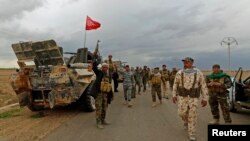Jihadi militants are employing guerrilla tactics -- everything from planting improvised explosives to hit-and-run attacks -- in an effort to impede Iraqi forces in their efforts to retake Tikrit.
While the battle rages for the town 129 kilometers north of Baghdad, analysts fear an opportunity is being squandered to split Sunni tribesmen and Saddam Hussein-era military officers from their alliance with Islamic State militants.
Tensions have been mounting in recent weeks among the disparate groups of the Jihadi-led Sunni Muslim insurgency that stormed across northern and western Iraq to seize a large swath of Iraqi territory.
Former military officers and intelligence officials still loyal to Hussein’s Ba'ath Party have been key participants in the insurgency, forming a common cause with Islamic State militants.
Recent Jihadi abductions of Iraqi Christians have prompted disgust among some of their Baathist allies, adding to internal frictions within the alliance, say analysts and Kurdish military officials.
They fear the offensive to reclaim Tikrit -- the hometown of former Iraqi strongman Hussein, who was toppled by the 2003 U.S.-led invasion -- will drive the Baathists and militants closer together.
“The assault risks reducing the tensions by giving IS and the ex-Baathists a common cause while the assault is occurring. This is especially true because of the presence of Shia militias in the assault, who regularly commit atrocities against Sunnis,” predicted Daveed Gartenstein-Ross, an American counter-terrorism analyst at the Foundation for Defense of Democracies, a Washington, D.C.-based group.
The Ba'ath Party was founded by a Syrian-born Christian, Michel Aflaq, and Christians occupied important government positions in Saddam Hussein’s Iraq. His foreign minister, Tariq Aziz, one of Hussein’s most trusted advisers, was a Christian.
Crucial offensive
The importance of Shia militias in the assault launched Monday on Tikrit -- and behind them the role of Iran -- is becoming clearer. Shia militia sources say General Qasem Soleimani, the commander of Iran's Islamic Revolution Guards Corps [IRGC], is personally coordinating the operation from behind-the-scenes. It is the biggest offensive yet to retake one of the militants' main strongholds and to regain ground lost to Jihadis several months ago.
Iranian authorities have not commented officially on Soleimani’s role. Iran's government-owned Fars news agency, however, has reported on his presence in Iraq, publishing photographs purportedly showing the general with Iraqi commanders and describing the pictures as having been taken near Tikrit.
A large proportion of the 30,000-person assault force assembled by the Baghdad government is comprised of Iraqi Shia militias, notably the Badr Organization, whose political wing formerly was the Tehran-allied Supreme Council for Islamic Revolution in Iraq. Shia volunteer militias from the Popular Mobilization units are forming the vanguard leading the assaults on Tikrit, coming from three directions.
The Islamic State rallied Sunni Muslims in western and northern Iraq by promoting itself as their defender against Iraq’s Shiite-led government and security forces. Tikrit fell quickly as the Iraqi security forces crumbled and fled.
Testifying Tuesday to a U.S. Senate panel, General Martin Dempsey, chairman of the Joint Chiefs of Staff, told senators he estimated that two-thirds of the assault force on Tikrit consists of Shia militiamen. He noted that Iran's presence is overt, especially when it comes to artillery being used in the offensive. “Frankly, it would only be a problem if it resulted in sectarianism,” he said.
Exploiting vulnerabilities
Analyst Gartenstein-Ross does see it as a problem -- despite the assurances given to Tikrit Sunnis by Iraqi Prime Minister Haider al-Abadi, who has promised amnesty for tribal fighters who break with the extremists, saying it is their “last chance” to ally with the government. He said the involvement of the Shia militias will act as a unifying principle for the Sunni alliance.
He identified “paranoia” as Islamic State's biggest short-term weakness, noting that in recent weeks there have been multiple purges within the group.
“One of the most promising vulnerabilities to exploit in ISIL is its tendency to eat its own. That should be accentuated and drawn out wherever possible,” said Gartenstein-Ross. The Tikrit assault diverges from the strategy.
He argued that an underlining strategy of the coalition against the militants should involve a psychological warfare campaign crafted to accentuate schisms.
“Including the use of disinformation, publicizing ISIL defectors, as well as arguments within the ranks,” said Gartenstein-Ross. "Coalition military operations should avoid striking ex-Baathist targets, thus sending a signal to both ISIL and the ex-Baathists at once.”
The Jihadis and Baathists have had eight months to prepare their defense of Tikrit -- a strategic city straddling the highway linking Baghdad with Mosul, the militants de facto capital in Iraq.
This is the third attempt by the Iraqi government to recapture Tikrit. The most intense fighting Wednesday was in the town of al-Dour, just south of Tikrit.
Iraqi government spokesmen say the offensive has managed to secure an area on the outskirts of the city, but the Islamic State is denying that Iraqi security forces have made significant gains, saying, “all of Tikrit city and the surrounding neighborhoods are under the Islamic State control and they have not taken a handful from it.”















